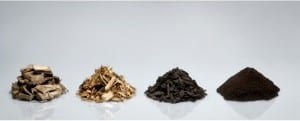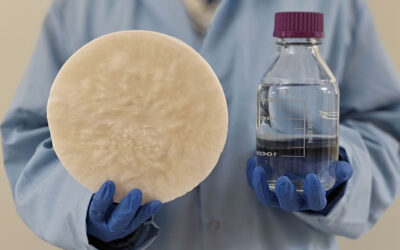 TorrCoal Technology BV has developed a technology to manufacture coal from wood waste: a charring process under air exclusion and at temperatures between 250 and 300°C, so-called torrefaction. This thermal treatment increases the mass-related and volume-related energy density and simultaneously the heat value of the raw material. In order to apply the wood as an efficient fuel in kiln firing, the char must be ground. Thus, TorrCoal turned to Neuman & Esser (NEA) who equipped the prototype system with an impact classifier mill ICM 240 and a cyclone cartridge dust collector.
TorrCoal Technology BV has developed a technology to manufacture coal from wood waste: a charring process under air exclusion and at temperatures between 250 and 300°C, so-called torrefaction. This thermal treatment increases the mass-related and volume-related energy density and simultaneously the heat value of the raw material. In order to apply the wood as an efficient fuel in kiln firing, the char must be ground. Thus, TorrCoal turned to Neuman & Esser (NEA) who equipped the prototype system with an impact classifier mill ICM 240 and a cyclone cartridge dust collector.
Initially, the Dutch company sieves the wood waste, removes rough parts and impurities and crushes them with a hammer mill. After torrefaction, the wood is transported to the classifier mill’s intake lock via a metering screw and a magnetic separator. The classifier mill crushes the wood to the desired average particle size of d50 = 150 µm.
Following grinding and classification, the powder is drawn out of the mill into a cyclone cartridge dust collector and separated from the flow of carrier air there. The grinding system with impact classifier easily reaches throughputs of up to 5,000 kg/h here. Impact classifier mills are best suited for crushing brittle solids to a defined upper particle size restriction. The ICM impact classifier developed and patented by NEA combines efficient impact crushing with high-precision classification in a single assembly. The desired fineness of the final product can be set infinitely variably via the classifier wheel’s rotational speed.
As torrefacted wood often has impurities such as sand, the fast-running ICM classifier mill requires special wear protection. Therefore, the grinding speed which influences wear disproportionately was reduced by one third. Furthermore, the exchangeable cladding in the grinding area as well as the grinding and classifying tools are extremely wear resistant.
A cyclone cartridge dust collector is attached above the impact classifier mill, which combines the principle of separation in a cyclone with an inlet spiral, cylindrical housing and a discharge cone with the advantages of a cartridge collector. The compact, pressure shock resistant filter saves costs and installation space. Therefore, the suction pipe from the filter to the ventilator, the sound insulation of the ventilator casing and the explosion check valve between the filter and the ventilator are no longer needed due to the radial ventilator. NEA has designed the grinding system explosion-protected and both the classifier mill and the cyclone cartridge filter pressure shock resistant, with dust explosion class St 2. The temperatures in the feed container and the finished product silos which can be rinsed with CO2 as required are monitored continuously.

















